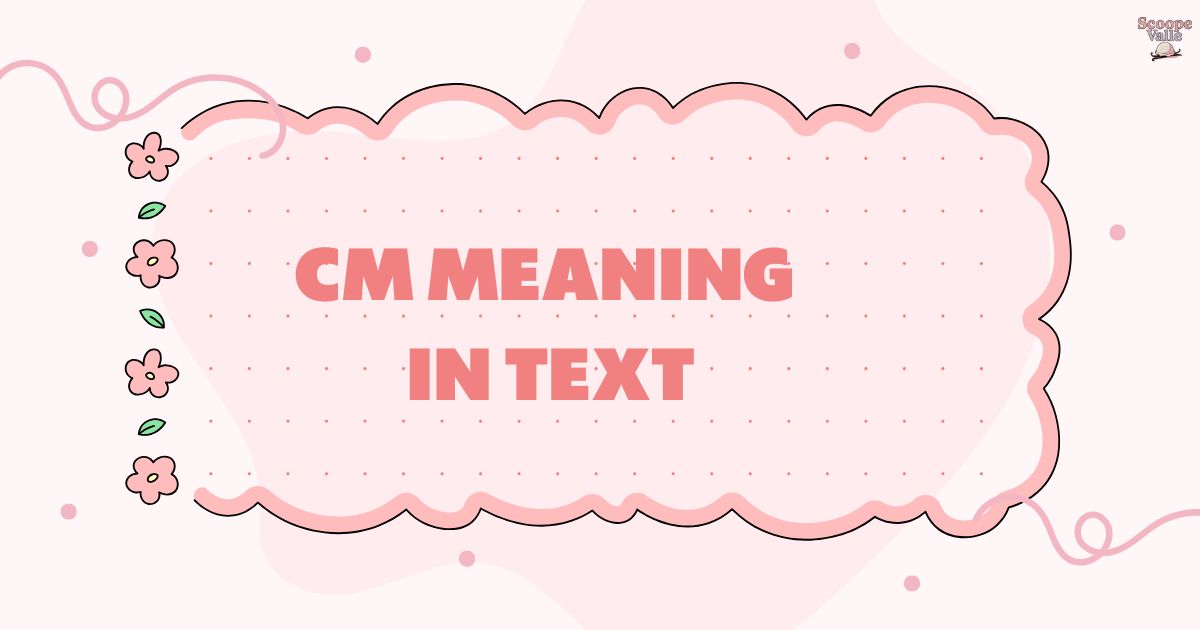The world of texting and online chatting is full of short forms and abbreviations. People use them to save time, type faster, and keep messages short. Among these many abbreviations, “CM” is one that often appears in text messages, social media comments, and even gaming chats.
If you have ever seen a message with “CM” and wondered what it means, you are not alone. This guide will explain everything about CM meaning in text, where it comes from, how to use it, and when to avoid it. By the end, you will feel confident using and understanding this popular shorthand in any conversation.
Definition & Meaning
In most texting and social media situations, CM stands for “Call Me.” It is a quick way to tell someone that you want them to give you a phone call. Instead of typing the full phrase “Call me,” people simply write CM.
For example:
- “Hey, I have news to share. CM when you can.”
- “Busy right now, but CM later tonight.”
The meaning is simple: the sender wants a voice call instead of a long text conversation.
However, CM can also mean centimeter, especially in science, math, or measurement discussions. For example:
- “The box is 20 cm wide.”
The real meaning depends on the topic of the conversation. If someone is talking about numbers, sizes, or measurements, CM likely means “centimeter.” But in casual texting or social media, it almost always means “call me.”
Also read: IIRC Meaning in Text: Your Ultimate Guide to This Handy Acronym
Background & History
The habit of using abbreviations like CM started many years ago, even before smartphones. In the early days of mobile phones, text messages (SMS) had character limits. People had to pay for every message, and typing on small keypads was slow. To save space and time, people began shortening common phrases.
Terms like “LOL” (laugh out loud), “BRB” (be right back), and CM (call me) became part of everyday texting. As technology improved and social media platforms like Facebook, Twitter, and Instagram appeared, these abbreviations spread even more.
Today, CM is widely recognized in English-speaking countries. Younger generations, in particular, use it frequently because they value quick, direct communication.
Usage in Various Contexts
One of the reasons CM is so popular is its flexibility. You can find it in many different types of online conversations. Here are some common examples:
1. Text Messaging
The most common place to see CM is in regular text messages.
Examples:
“I can’t explain everything here. CM when you’re free.”
“Running late. CM later tonight.”
2. Social Media
On platforms like Instagram, Twitter (X), or TikTok, people may write CM in comments or private messages.
Example:
“Loved your video! CM, I have a question.”
3. Gaming Chats
Gamers often use CM to plan strategies outside the game.
Example:
“Nice game! CM after this round so we can plan tomorrow’s match.”
4. Casual Conversations
Even friends catching up might use CM to avoid long typing sessions.
Example:
“It’s been ages since we talked. CM tonight?”
Common Misconceptions & Clarifications
Because CM has more than one meaning, it can sometimes cause confusion.
Here are some common misunderstandings:
- CM Always Means Centimeter
Some people think CM always refers to the unit of measurement. But in texting or social media, it usually means “call me.” - CM Is Only for Casual Chats
While CM is mostly informal, some people also use it in semi-professional settings, such as team messaging apps, when quick calls are needed. Still, it’s safer to avoid it in very formal emails. - CM Is a New Trend
Many believe abbreviations like CM are new, but they’ve been around since the 1990s SMS era.
Similar Terms & Alternatives
| Term | Meaning | Example |
|---|---|---|
| Call Me | Full phrase of CM | “Call me when you’re free.” |
| HMU | Hit me up (contact me) | “HMU when you’re online.” |
| Ring Me | British slang for call me | “Ring me tonight, okay?” |
| DM Me | Direct message me | “DM me for details.” |
How to Respond to “Cm”
If someone sends you a message with CM, your reply will depend on your relationship with the sender and the situation.
Here are some simple examples:
Casual Responses
- “Sure, I’ll call you after work.”
- “Okay, I’ll call you in 10 minutes.”
Funny Responses
- “Get ready for the most amazing call ever!”
- “Calling you now—don’t be shocked!”
Professional Responses
- “I’ll call you at 3 PM. Does that time work for you?”
- “Let’s schedule a call for tomorrow morning.”
Privacy-Conscious Responses
- “I’d rather text. Can you share the details here?”
- “Can we discuss this over email instead?”
Regional or Cultural Differences
The use of CM is most common in English-speaking countries, such as the United States, Canada, the United Kingdom, and Australia. In other regions, people may prefer full phrases or different abbreviations.
For example:
- In Japan, texting is often more formal and polite, so short forms like CM are less common.
- In European countries, people might simply write “call” or use local slang.
Comparison with Similar Terms
| Term | Meaning | Where It’s Used | Formality |
|---|---|---|---|
| CM | Call me | Texting, social media, gaming | Informal |
| HMU | Hit me up | Social media, texting | Very casual |
| DM Me | Direct message me | Social media, professional chats | Neutral |
| Ring Me | Call me (UK slang) | UK, informal chats | Informal |
Usage in Online Communities & Dating Apps
In modern online spaces, CM is also common on dating apps and social platforms where people move conversations from public to private.
Examples:
- On Tinder: “Hey, I’d love to know more about you. CM if you’re free tonight.”
- On Twitter/X: “Great post! CM if you want to collaborate.”
Hidden or Offensive Meanings
The abbreviation CM is generally safe and not offensive.
However, the tone of the message can change its effect. For example:
- “CM right now!” can sound demanding or aggressive.
- “Please CM when you can” sounds polite and respectful.
Suitability for Professional Communication
While CM is fine for texting friends or casual chats, it is not ideal for formal business communication.
In professional emails, it’s better to write the full phrase, such as:
- “Please call me when you are available.”
- “Can we schedule a call to discuss this?”
FAQ’s
What does CM mean in text messages?
CM usually means “Call Me”, a quick way to request a phone call.
Can CM mean something else?
Yes, in measurement contexts it can stand for centimeter.
Is CM okay to use in professional emails?
No, it’s too casual for formal communication.
How should I respond to CM?
You can reply with a time for the call or simply say, “Sure, I’ll call you soon.”
Is CM used worldwide?
It’s popular in English-speaking countries but not as common globally.
Conclusion
In today’s digital world, knowing abbreviations like CM can make texting and online conversations smoother. Most of the time, CM simply means “Call Me,” a quick request to move from text to a voice call. Whether you are messaging friends, commenting on social media, or planning a game strategy, understanding this simple abbreviation helps you communicate more clearly and confidently. Always remember to check the context sometimes CM still means centimeter, especially in science or measurement discussions. And if you are writing in a professional setting, it’s better to use full words for clarity.
Tylor John, with five years’ experience, beautifully crafts information on all topics and inspiring readers worldwide with positivity, faith, creativity, love, and hope.

